|
|
|
Sort Order |
|
|
|
Items / Page
|
|
|
|
|
|
|
| Srl | Item |
| 1 |
ID:
186491
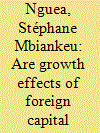

|
|
|
|
|
| Summary/Abstract |
Sub-Saharan Africa's electrification rate of 45% in 2018 remains extremely low compared with other developing regions. This study investigates if foreign capital could significantly contribute to enhancing the electricity access rate in Africa, a subject so far neglected in the literature. Specifically, it seeks to know whether increasing FDI, remittances and foreign aid matter for access to electricity in Africa. We utilize a dynamic panel System-Generalized Method of Moments (Sys-GMM) estimator to analyse data collected on a panel of 36 African countries over 2000–2017. The empirical findings show that FDI and remittances are positively and significantly related to increasing access to electricity. Moreover, our results show that foreign aid reduces the electricity access. We finally find that remittances reduce urban-rural disparities in access to electricity, while FDI and foreign aid increase disparities. These results remain consistent when we perform sub-regional analyses, suggesting that African countries should rely more on remittances and FDI to promote universal access to electricity.
|
|
|
|
|
|
|
|
|
|
|
|
|
|
|
|
| 2 |
ID:
113688
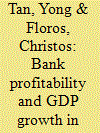

|
|
|
|
|
| Publication |
2012.
|
| Summary/Abstract |
This article examines the effect of GDP growth on bank profitability in China over the period 2003-2009. The one-step system GMM estimator is used to test the persistence of profitability in the Chinese banking industry. The empirical findings suggest that cost efficiency is positively related to bank profitability, while lower profitability can also be explained by higher taxes paid by banks. In addition, there is a negative relationship between GDP growth and bank profitability. Furthermore, the results show that (1) the profitability in the Chinese banking industry is significantly affected by the level of non-performing loans, and (2) Chinese banks with higher levels of capital have lower profitability. Finally, we find that the departure from a perfectly competitive market structure in the Chinese banking industry is relatively small.
|
|
|
|
|
|
|
|
|
|
|
|
|
|
|
|
| 3 |
ID:
166351
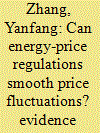

|
|
|
|
|
| Summary/Abstract |
Due to the dominance of coal in China’s energy mix, coal prices have always been a challenging part of pricing reform. The recent frequent government interventions raise the key research questions: what is the actual impact of price policies on coal price fluctuations, and how can forward-looking pricing policies be made. By proposing a novel classification of coal pricing policies and introducing an expectation and forward-looking coefficient, the paper examines the relationship between coal price fluctuations and pricing policies using the generalized method of moments (GMM) method. It shows that the lagging coal price and coal demand play a positive role in regulating coal prices, while coal supply and marketization have significantly negative effects on coal price fluctuations. The heterogeneous impacts of price policies are due to differences in market players’ expectations, policy instruments and the methods of policy release. In addition, China’s coal pricing policy portfolio from 2013 to 2016 exerted synergy effects on the restraint of coal price fluctuations. As the forward-looking coefficient was considerably low, the government's intervention behaviors were obviously biased towards ex post facto responses. The paper suggests short run and long run policies to advance marketization of coal prices amid the energy transition.
|
|
|
|
|
|
|
|
|
|
|
|
|
|
|
|
| 4 |
ID:
143424


|
|
|
|
|
| Summary/Abstract |
In the past decade, China's outward foreign direct investment (FDI) has increased significantly. On the other hand, the Chinese economic growth model is heavily reliant on domestic investment. Our study examines the important issue of how China's domestic investment responds to its FDI outflows. We investigate this issue analyzing, for the first time, China's domestic investment at industrial level. We specifically account for the factor of government support given the significant role played by the state in the Chinese economy. Using industrial level data, we further evaluate whether domestic investment reacts to outward FDI differently between state dominated and non-state dominated industries. Our study adopts an accelerator model where the system-Generalized Method of Moments (GMM) is employed for our estimations. Our empirical results suggest that domestic investment responds positively to outward FDI in China, Furthermore, the FDI outflows influences domestic investment differently depending on the level of government support in the particular industries. Such influence is much stronger in state dominated industries than in the non-state dominated ones.
|
|
|
|
|
|
|
|
|
|
|
|
|
|
|
|
| 5 |
ID:
183620
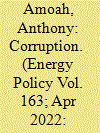

|
|
|
|
|
| Summary/Abstract |
Increasingly, a significant part of the literature on corruption establishes a negative relationship between corruption and economic variables. However, empirical research showing the influence of corruption on renewable energy consumption is useful because of the global interest in achieving a low-carbon and clean environment. In this light, we model a relationship between corruption and renewable energy consumption (% of total final energy consumption) in Africa. Using a panel dataset for 32 African countries covering the period 1996–2019, we first show that perception about corruption is relatively high in Africa. In line with corruption theory, both Generalized Method of Moments and Instrumental Variable estimation techniques are used to establish that corruption is inimical to the share of renewable energy consumption in total final energy consumption in Africa. To investigate the robustness of the results, we disaggregate the sample into high and low environmental performance countries as well as upper and lower-middle-income countries and still find consistent results. Our results call for strategic policies and institutional structures that seek to prevent corruption from further permeating the continent's administrative structures.
|
|
|
|
|
|
|
|
|
|
|
|
|
|
|
|
| 6 |
ID:
181473


|
|
|
|
|
| Summary/Abstract |
This paper advances research in the resource curse literature in several directions. Firstly, using different measures of oil dependence and abundance, it investigates the validity of the oil curse hypothesis in energy-rich developing countries. Secondly, the paper studies the impact of human capital, institutional quality, and trade openness on the growth of these countries. Thirdly, it examines the interaction effect of human capital and oil dependence/abundance on the growth of oil-rich developing counties. Fourthly, we estimate a set of panel data models by the Generalized Method of Moments (GMM) to address the endogeneity problem. The estimation results confirm the oil curse hypothesis. Furthermore, our findings underscore the significant role of higher human capital, better institutional quality, and trade openness in boosting economic growth. These results are robust to the way the quality of institutions is measured. Moreover, we find a threshold level for human capital above which the oil curse vanishes. Our finding, hence, highlights the crucial role of human capital in offsetting the adverse effect of oil abundance/dependence on output growth. The fact that poor quality of human capital and weak institutions hinder economic growth has important policy implications for social planners and policymakers in oil-rich developing countries.
|
|
|
|
|
|
|
|
|
|
|
|
|
|
|
|
| 7 |
ID:
169905
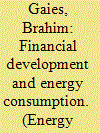

|
|
|
|
|
| Summary/Abstract |
This paper examines the relationship between financial development and energy consumption estimations in the major MENA countries (Algeria, Bahrain, Egypt, Iran, Iraq, Israel, Jordan, Kuwait, Lebanon, Libya, Morocco, Oman, Qatar, Saudi Arabia, Syria, Tunisia, United Arab Emirates and Yemen) over the period 1996 to 2014. We consider the energy use in kg of oil equivalent per capita as a dependent variable that reflects the cross-country energy consumption. We measure the level of financial development in the MENA countries by considering banking indicators. Extending the model of Sadorsky (2011), we estimate both linear and non-linear dynamic panel model. We use new robust econometrics to take into account heterogeneity and nonlinearity and we control the estimation results for the period of the global financial crisis. The results of the study report a positive and statistically significant relationship between the intermediation capacity of the banking system as well as its size and energy consumption. The findings also confirm a non-linear and inverted U-shaped relationship between financial development and energy demand for the MENA region. This implies that initially energy demand increases with financial development and then, at a turning point of financial development, it declines. The policy implications of these results are discussed.
|
|
|
|
|
|
|
|
|
|
|
|
|
|
|
|
| 8 |
ID:
095929


|
|
|
|
|
| Publication |
2010.
|
| Summary/Abstract |
We model provincial inflation in China during the reform period. In particular, we are interested in the ability of the hybrid New Keynesian Phillips Curve (NKPC) to capture the inflation process at the provincial level. The study highlights differences in inflation formation and shows that the NKPC provides a reasonable description of the inflation process only for the coastal provinces. A probit analysis suggests that the forward-looking inflation component and the output gap are important inflation drivers in provinces that have advanced most in marketisation of the economy and have most likely experienced excess demand pressures. These results have implications for the relative effectiveness of monetary policy across the Chinese provinces.
|
|
|
|
|
|
|
|
|
|
|
|
|
|
|
|
| 9 |
ID:
166470
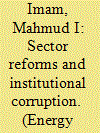

|
|
|
|
|
| Summary/Abstract |
In order to reduce the influence of corruption on electricity sector performance, most Sub-Saharan African countries have implemented electricity sector reforms. However, after nearly two and half decades of reforms, there is no evidence whether the reforms have mitigated corruption. Neither is there evidence of performance improvement of the reforms in terms of technical, economic or welfare impact. This paper aims to fill this gap. We use a dynamic panel estimator with a novel panel data of 47 Sub-Saharan African countries from 2002 to 2013. We analyse the impact of corruption and two key aspects of electricity reforms – creations of independent regulatory agencies and private sector participation – on three key performance indicators: technical efficiency, access to electricity and income. We find that corruption can significantly reduce technical efficiency of the sector and constrain the efforts to increase access to electricity and national income. The adverse effects are reduced where independent regulatory agencies are established and privatisation is implemented. These findings suggest that well-designed reforms not only boost the performance of the sector directly, but also indirectly reduce the negative effects of macro level institutional deficiencies such as corruption on micro and macro performance indicators.
|
|
|
|
|
|
|
|
|
|
|
|
|
|
|
|
|
|
|
|
|